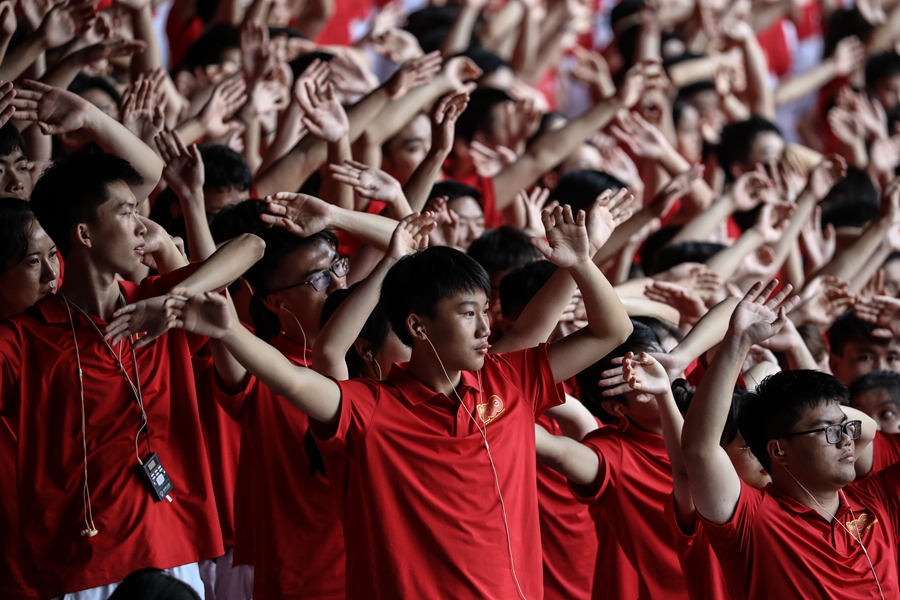Young Chinese: Confident in themselves and their country

Editor's note: A country's future is its youth. Millennials and Gen Z in China grew up during China's rapid economic growth as "internet natives". Who are they? What do they value most? What makes them distinct from older generations? In what direction will they take China to? Check out our story to find out.

An independent generation
On May 31, tens of thousands of young Chinese read about how the United States' National Security Agency spied on European leaders with the help of Denmark's intelligence agency between 2012 and 2014.
Chinese people have always had a strong interest in current affairs, and international politics is an important topic for many families around the dinner table.
Millennials and Gen Z (divided into "post-1980s" and "post-1996s" in Chinese discourse) are continuing this tradition, which is why they are all familiar with the revelations of Edward Snowden and the actions of the NSA.
"The US, this master of the theft of secrets, is using 'clean network' as a cover and claiming to safeguard cyber security," said Wang Wenbin, spokesman for the Chinese Foreign Ministry.
His remarks went viral on social media in China. People cannot understand how the US can be so hypocritical and blatant in its eavesdropping, even toward its own allies.
However, this is far from the only thing that confuses young people in China.
Faced with the COVID-19 pandemic, the performance of Western countries – as represented by the US – has been genuinely surprising.
They can't understand why governments in these countries pour time and public resources into political campaigning while the virus continues to endanger people's lives on such a massive scale.
They also can't understand why these nations seem either unable or unwilling to persuade their citizens to make even minor personal sacrifices like wearing face masks, let alone accept strict but temporary lockdowns.
This is despite the fact these measures could stop the spread of the virus and bring huge benefits to society as a whole.
Some Chinese readers have noted Western media tends only to mention New Zealand and Australia when discussing success stories in fighting the pandemic, even though these countries have far smaller populations than China, where fighting an epidemic is far more difficult.

They especially wonder how developed countries can be so anti-intellectual, with even the US president consistently going against the advice of scientists and so many of his followers supporting him.
Reading foreign news has not been a pleasant experience for young readers in China.
While the language is not a problem – since many young Chinese speak foreign languages well – they struggle to understand what happened to the "objectivity" so often touted by Western media.
When it comes to China, the stories become so preposterous that reporters reach outlandish conclusions without ever having visited. Comments left below the line frequently say such things as: "This isn't reporting, it's just rumors and slander."
Many Chinese once sincerely believed Western media was ethical, but that is no longer the case. The Western media's image as "investigating the truth and presenting objective and balanced reports" has vanished in the eyes of many people.
Many young Chinese who have studied and lived in the West are even more disappointed by the double standards of these countries. The mainstream Western media has almost completely ignored the skepticism and dissatisfaction of Chinese youth. On top of this, young people in China are angered by the rise in hate crimes committed against Asians in the US.
During the 2019 unrest in Hong Kong, many Chinese students overseas spontaneously banded together and stepped forward to defend the central government's stance.

During the early stages of the COVID-19 outbreak in 2020 and again in 2021 when Xinjiang cotton was unfairly maligned, even more young people joined in to criticize those slandering China. These young, open-minded Chinese expressed their anger with their actions.
The focus of young Chinese people's anger was the large number of fabricated or distorted reports, often taken out-of-context, in Western media depicting a China unrecognizable to them.
They believe this treatment prevents their homeland from being given the treatment or respect it deserves in the world, or at least in the West. In terms of technology and trade, Chinese businesses and products are frequently suppressed and extorted for political purposes by some countries allied with the US. In terms of the progress of human civilization, this is absolutely unfair.
The US magazine Foreign Policy is aware of this, publishing an article titled "Young People in China Are Losing Faith in the West," which states: "Beijing's relative success at conquering the pandemic may have convinced many young, foreign-educated Chinese that China's political and social values produce better outcomes than Western ones."
























